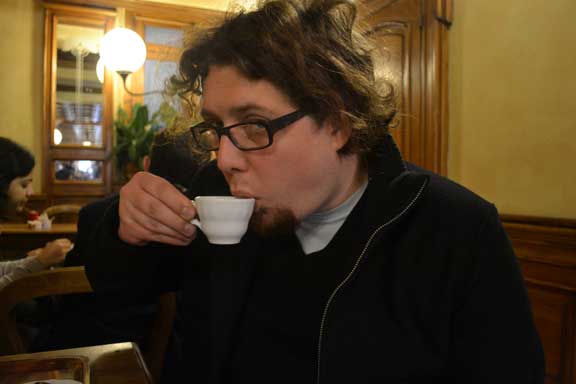
Looking at Joseph Riippi — 6″4, wild hair, hands that eat mine in a handshake and a imposing presence — you would never suspect the sensitive, tender writing that flows from his prodigious mind. Given all of our collective wisdom I should know by now not to conflate the physical and the emotional, I should be aware of the discrepancy between our physicality, largely unchosen, bestowed, and our interior worlds molded by our choices, our experiences, and the choices of other people, but given his daunting physical presence coupled with a rare empathic tender effort in his writing, this mistake persists with Riippi.
In his most recent effort, the novella A Cloth House, Rippi, with the restraint of a poet but the scope of a novelist, crafts an magically empathic story of a simple family coping with the tragedy of life. The narrator – nameless – writes short letters to her dead baby sister about her family. Her mother, quashed by her expectations of accomplishment, slowly loses her war against cancer after the accidental death of her daughter. Her father, a kind, philosophical and gentle man, devotes his life to the idea of God as Love despite the tragedies, and herself, introverted, hidden from the world, chubby, grapples with her memories from childhood to the present moment.
I first thought this style as an anomaly for Riippi: what young writer can write with such empathy about a chubby little girl, a mother dying of cancer, and a beautiful father attuned to the small beauty in life? This felt like a great feat, but then I worked backwards and read his The Orange Suitcase, a sort of impressionistic family memoir of a young writer written in the same evocative, minimalist poetic style of his other work. Curiously, I always get the feeling when reading his work that Riippi feels an overwhelming need to hold back, to not show off his intelligence and to strip down his sentences to bare poetics. However, in one of those quirks of writing in which style flows less from choice than from necessity, Riippi, a copywriter in an ad agency writes in those spaces of time that 60-70 hour work weeks afford – writing in front of a TV or for 30 minutes between meetings.
Born in Seattle, educated in Virginia at the College of William and Mary, and in the midst of receiving his M.F.A. from the City College of New York, Riippi displays an acute sense for the taste of different settings. In The Orange Suitcase Riippi captures that ineffable texture and tone of New York City, while in A Cloth House he lovingly portrays the summer life on an island off the coast of a Canada, a sort of cold, dark living in stark contrast to the movement of city life.
Riippi’s books often explore the idea of memory itself, focusing on its vagaries and complexities. Much of his work involves a person telling a story of the past as they investigate the elusive nature of memory. Essentially, Riippi finds his characters asking the same question: if we misremember even our basic memories then how can we easily create a divide between fiction, if a an old father ravaged by a life of tragedy takes solace in recreated memories can we feel certain we understand “true” happiness. Fiction, as many previous authors have noted, offers a particularly friendly medium for these types of exploration and Riippi uses it well creating cohesive narratives out of small vignettes of memories.
In this sense, his work reminds me of the evocative work of certain directors like Terrence Malick who offers you wordless archetypal images that say more than extensive discussions on the topic because of the associative powers of imagination. In the autobiographical The Orange Suitcase, the eponymous object serves as both an object and a recurring symbol of his grandfather as a person full of wonder and mystery. His attention to the details of small objects, seeing in them something always larger encompasses much of his works propulsive power.
Though first and foremost a fiction writer, Riippi feels comfortable in numerous mediums. Unafraid of poetry and soon to be a playwright, he sees the consistency between these mediums as an exploration of his own self. Riippi notices the patterns of his writing and seeks to write past his comfort zone, but as a young writer, he realize the time it takes to grow out of your natural style. Currently working on a book of historical fiction about his grandfather’s skiing troop that hunted down Nazis (perhaps one of the coolest ideas for a piece of fiction I’ve heard in a while), Riippi feels the challenge of writing a much more traditional narrative. Given Riippi’s prolific abilities – he recently finished an adaptation of a play he wrote into prose, and given he wrote the first draft of The Orange Suitcase in one weekend I tend not to worry about his ability to finish this ambitious project. I’m simply excited.

1 comment